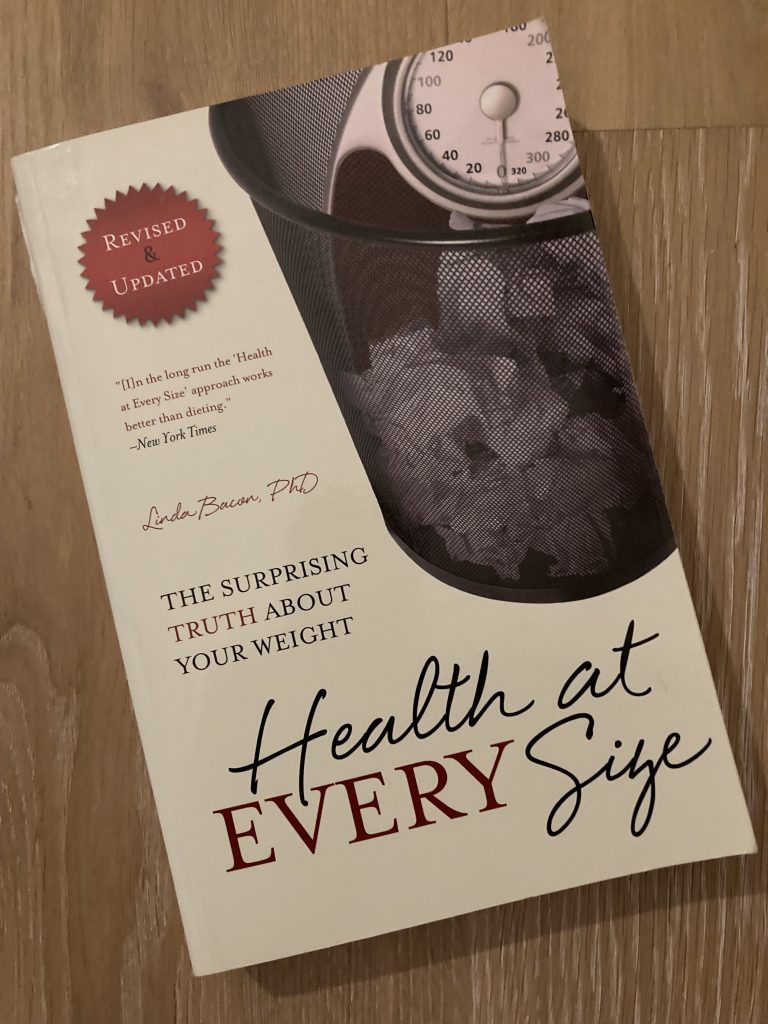The definition of Health at Every Size (HAES) may initially appear to be easy to understand. Many HAES advocates argue that all bodies, regardless of size, can achieve and maintain ‘good’ health. Yet, meanings and understandings of HAES have a complex and contentious history. HAES can loosely be separated into two branches. The most popularised branch has now been trademarked and was adapted and popularised by healthcare professionals such as Lindo Bacon, Deb Burgard and Lucy Aphramor. The other is perhaps lesser known to people outside of the fat activist movement but has its roots in early fat liberation where fat people were first able to discuss their dismal experiences of healthcare as part of community organisation.
Both branches argue that something like HAES is necessary as fat people in westernised cultures experience a medical pathologizing which can harm them through access barriers and discrimination in healthcare settings. That stigma can also lead to a misunderstanding of how to ‘do’ health for many fat people with many healthcare professionals who are not HAES-aligned recommending weight loss as a medical remedy for anything from earache to bone fractures. Both branches of HAES encourage researchers and healthcare professionals to consider alternative explanations for ill health other than ‘obesity’; such as weight-based stigma in social and employment settings and biased medical care.
HAES-like discussions in activist circles can easily be traced back to one of the earliest fat activist groups named The Fat Underground in 1974 and this ‘branch’ is recognised through dialogues around methods of talking to doctors, safe and supportive ways to exercise, a lack of shaming around food and weight, and a pushback against the pathology of fatness more generally. The focus of an activist HAES is largely around what the healthcare profession can do to change their approach to provide better healthcare for people of all sizes. Fat people are at the centre of this version of HAES, meaning that fat people’s lived experience is listened to and learnt from. While individual health may be important to activists, it is not the sole objective and discussions and advocacy are more likely to surround equal access to healthcare that does not depend on whether a fat person is engaging in ‘healthful’ activities.

The other branch of HAES is more professionalised and is best recognised through the work of Lindo Bacon who, in 2008, published Health at Every Size: The Surprising Truth About Your Weight which outlines ways to ‘quit’ dieting and to aim for health outcomes separate from weight loss or body mass index (BMI). Bacon has significant prominence in the professional HAES community which is demonstrated by their website Health at Every Size Community, which as of March 2022 shows nearly 22,000 supporters of HAES have taken the pledge. The website material advertises Bacon as a champion of size-accepting and intuitive healthcare in those deemed to be ‘obese’. These methods tend to rely on encouraging former dieters to ‘listen’ to their body’s intuitions and take a nurturing rather than shaming approach to healthcare.
However, as mentioned, there are contentions amongst HAES activists and professionals on how HAES should be done and who it rightfully ‘belongs’ to. On reflecting on the origins of HAES, eating disorder specialist Deb Burgard argues that although healthcare professionals had been recruited to help tackle the ‘war on obesity’, (which much like the war on drugs is about a war on a specific group of people) many of those specialists were actually attempting to create a public health model that was suitable for people of all sizes. Although Burgard indicates she recognises that activists were involved in the development of HAES, she rejects that HAES is overly influenced by, what she calls, the size acceptance movement. HAES, she argues, originally evolved from medical and healthcare professionals who were frustrated with unequal healthcare regardless of whether they were or were not aware of the size acceptance movement.
Regardless of activist input, in 2010 the decision was made at the ASDAH (Association of Size Diversity and Health) Conference, to trademark HAES to prevent weight loss corporations from using HAES associated language and practices. HAES practices that carry the HAES® trademark must comply with the basic principles which can be found on ASDAH’s website. Unfortunately, trademarking HAES meant that many activists who had been developing HAES ideology both alongside and separately from medical professions were suddenly vulnerable to experiencing new forms of gatekeeping. Trademarking, Jacqui Gringas and Charlotte Cooper argue, separates the ‘professional’ HAES advocates from the ‘amateurs’ which means that professional bodies get to decide who is part of the HAES group and who is excluded.
In contrast to activist HAES, professionalised HAES tends to fall into an individualised stance on health, which seeks to show fat people what they can do to change their health outcomes — even Bacon’s book is targeted at the would-be ‘patients’ rather than the professionals who administer healthcare. This individualised approach to health is often in danger of shifting the responsibility from healthcare systems to individuals, thus nullifying the ideology of ‘shame-free’ approaches which are often heavily advertised by the HAES professionals.
Although HAES has a complex history, many people find power in both branches. That being said, it is important to recognise that even HAES professionals such as Aphramor, have begun critiquing contemporary HAES for ‘not going far enough’ and its links to white supremacy – due to its focus on Western science and individualised approaches to health that often ignore racism. To prevent the repetition of old mistakes, in a reconsideration of HAES, professionals should call on the expertise of activists to recreate a contemporary HAES that focuses on restructuring health systems that prioritise universal care regardless of individual health practices.